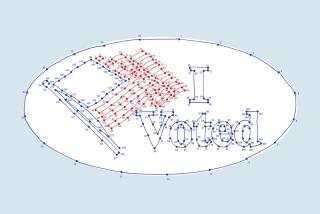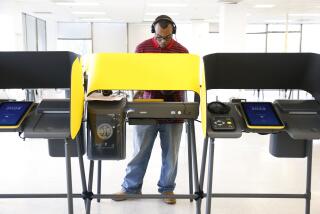A Distinction We Can Live Without
- Share via
SACRAMENTO
California again is leading the nation. Yes, we’re No. 1. On March 5, we will be the first this year to hold a state primary election.
It’s no honor. Nobody’s celebrating. Many people don’t even realize there’ll be an election, judging by all the “undecideds” in polls.
“No one is focused on the election at all,” says state Sen. Ross Johnson (R-Irvine). “And I’m talking about fairly sophisticated people. I was at a Chamber of Commerce annual dinner, and people you’d characterize as community leaders were saying, ‘Oh, god, that’s coming up?’ ”
Sen. Don Perata (D-Alameda), chairman of the Senate Elections and Reapportionment Committee, says: “There is not a single thing to recommend a March primary. This is just silly.”
Veteran Republican analyst Tony Quinn did some checking and found that California’s primary is the first this year. Texas follows a week later, then Illinois a week after that. But no other state has a primary until May. A dozen are in June. The biggest primary day is Sept. 10, with 10 states holding elections.
There’s a move to push California’s primary to September--or at least to June--and hold a separate, early presidential primary every four years.
California used to have a very comfortable June primary. The days were long and balmy, the weather right for convertibles and outdoor rallies.
Now it’s the dead of winter. Only candidates and their cronies are thinking politics. We’ve just come through the holidays and the Super Bowl. Next up is the Olympics. Then it’s tax time.
So whose bright idea was this?
This you can blame on Democrats.
*
Let’s back up: Both parties wanted to move up the presidential primary to gain clout in the nominating process. They were sick of watching candidates kowtow to pipsqueak New Hampshire.
California tried a late March primary in 1996, and it had virtually no impact. In 2000, the primary was moved to early March, with marginal effect; George Bush clinched the GOP nomination here.
Between 1996 and 2000, the Legislature had to pass another bill moving up the presidential primary from June. Secretary of State Bill Jones and Sen. Jim Costa (D-Fresno) pressed hard in 1998 and pushed a measure through the Senate. It would have provided a March primary only in presidential years. In “off-years”--like 2002--there’d be a June primary.
But in the Assembly, some Democrats got clever. They got the bright idea of insisting that all primary elections be permanently moved to early March. Why? Because Democrats were plotting a defense of their once-a-decade redrawing of legislative and congressional districts in 2001.
An early 2002 primary would not leave Republicans much time to mount a referendum campaign against a Democratic gerrymander. And even if they could, the entire primary would be thrown into chaos. A court would quickly have to decide which districts the candidates should run in--the old or the newly drawn. The GOP would risk a political train wreck.
Jones recalls it vividly: “Democrats wanted to put the squeeze on Republicans and not give us time to referendum a reapportionment.”
But Jones accepted the Assembly amendment, figuring the state primary eventually could be moved back to June. Gov. Pete Wilson went along because he still dreamed of running for president in 2000 and an early home-state primary would help.
“It didn’t work out the way either party expected,” Quinn notes. “The March primary has been a disaster.”
Everything became moot.
Wilson didn’t run.
The Bush White House asked Republicans to compromise with Democrats on a “status quo” redistricting plan that would assure retention of 20 GOP congressional seats. That likely would clinch continued GOP control of the U.S. House. In return, Democrats locked up control of the state Legislature for many years.
In the end, Republicans had no interest in a referendum--and were too broke anyway.
But voters are stuck with this early primary.
Maybe not in the future.
Johnson intends to introduce a bill to hold a separate, early presidential primary and a state primary in September.
The state Chamber of Commerce and Business Roundtable are getting behind the September primary move. They think it’s good political reform: The campaign season is condensed and the shortened races require less special interest money to fund.
Voters pay more attention.
Myself, I’m nostalgic for June. But post-Labor Day would be better than pre-St. Pat’s.
On this, we just don’t ever again want to be No. 1.
More to Read
Get the L.A. Times Politics newsletter
Deeply reported insights into legislation, politics and policy from Sacramento, Washington and beyond. In your inbox twice per week.
You may occasionally receive promotional content from the Los Angeles Times.









